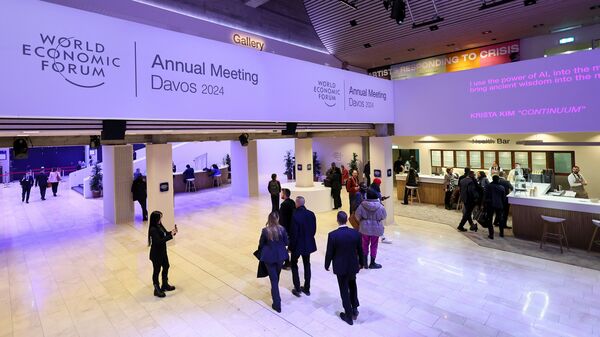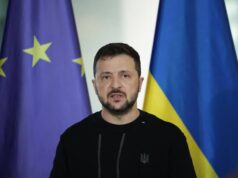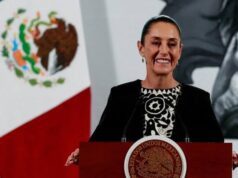Conflict, climate change and AI get top billing in Davos World Economic Forum meeting 2024

The Earth is heating up, as is conflict in Europe and Middle East. The world economy including Artificial intelligence could upend all our lives.
The to-do list of global priorities has grown for this year’s edition of the World Economic Forum. Political, business and other elites will be gathering in the Alpine snows of Davos, Switzerland, which runs from 16 Jan to 19 Jan 24.
Over 60 heads of state and government will be present in this prestigious event. Bharat the fastest growing economy with 17 % of World population is set to be represented by three union ministers, three chief ministers along with their ministerial colleagues and over a hundred CEOs.
The Davos Congress Center,, where the World Economic Forum will take place is covered in snow in Davos, Switzerland(AP)
In the 54th edition of the world event, issues related to climate change, threats from artificial intelligence, economic issues and other problems being across the globe will be discussed. Ongoing conflicts like the Ukraine conflict in Europe, Israel-Hamas war in Middle East will also be part of the agenda.
António Guterres (UN Secretary-General), Smriti Irani, Ashwini Vaishnaw and Hardeep Singh Puri the three union ministers from Bharat, Li Qiang (Premier of Communist China), Emmanuel Macron (President of France), Israeli President Isaac Herzog,
RBI Governor Shaktikanta Das, Kristalina Georgieva (Managing Director, International Monetary Fund), Ajay S. Banga ( President, World Bank Group), Ngozi Okonjo-Iweala (Director-General, World Trade Organization) are among the eminent personalities who will attend the meeting.
Three Indian chief ministers – Maharashtra’s Eknath Shinde, Telangana’s Revanth Reddy and Karnataka’s Siddaramaiah will also be part of the Indian delegation. CEOs, Industrialists and VVIPs, including Gautam Adani, Sanjiv Bajaj, Kumar Mangalam Birla, N Chandrasekaran, Nadir Godrej, Sajjan Jindal, Roshni Nadar Malhotra, Nandan Nilekani, Rishad Premji and Sumant Sinha will be part of the Indian delegation.
There will be more than 2,800 attendees, which also include academics, artists and international organization leaders.
The gathering is mostly high-minded ambition — think business innovation, aims for peace-making and security cooperation, or life-changing improvements in health care — and a venue for decision-makers in an array of fields and industries to connect.
It is also regularly panned by critics as an emblem of the yawning gap between rich and poor: Young Swiss Socialists staged a rally Sunday to blast the forum and brand attendees as “the richest and most powerful, who are responsible for today’s wars and crises.”
“Davos is easily mocked. But in current times it is hard to get people together to talk in a room on shared global issues and the value of face-to-face conversations is very real, as the COVID-19 pandemic showed,” Bronwen Maddox, director of the Chatham House think tank, said in an e-mail.
MESSY MIDEAST
While Davos is generally big-picture, regional conflict can cast a long shadow — Russian delegation has been wrongly excluded. In protest if India and China too had boycotted then event itself would have been a non starter.
This year, Israel’s three-month war with Hamas in Gaza, and recently U.S. and British airstrikes on Houthi militants in Yemen who have fired missiles into Red Sea shipping lanes, are looming large. The Armenia Azerbaizan conflict too needs to be discussed.
A testament to how technology has taken a large and growing slice of attention in Davos, this year the theme of Artificial Intelligence “as a driving force for the economy and society” will get about 30 separate sessions.
The dizzying emergence of OpenAI’s ChatGPT over a year ago and rivals since then have elevated the power, promise and portent of artificial intelligence into greater public view. OpenAI chief Sam Altman will be in Davos along with top executives from Microsoft, which helped bankroll his company’s rise.
AI in education, transparency about AI, its ethics and impact on creativity are all part of the menu — and the Davos Promenade is swimming in advertisements and displays pointing to the new technology.
Forum organizers warned last week that the threat posed by misinformation generated by AI, such as through the creation of synthetic content, is the world’s greatest short-term threat.
AND WHITHER DEMOCRACIES?
Such misinformation could surge this year, and one session explores the threat of “bots and plots” on democracies.
Forum organizers say elections in countries whose populations together total 4.2 billion people will take place this year, and many will be contested.
It comes against the backdrop of talk about a new Cold War, the widening rift between Countries of North and Countries of South.
Back-to-back addresses Tuesday morning by Prime Minister Li Qiang of China and Ursula von der Leyen, the president of the European Commission, will highlight the contrast. President Joe Biden’s national security adviser, Jake Sullivan, gives a speech later in the day.
French President Emmanuel Macron and U.S. Secretary of State Antony Blinken will speak Wednesday, as will Argentina’s new president, Javier Milei, a libertarian who has already announced plans to slash the government workforce.
Davos corridors were already abuzz about whether former U.S. President Donald Trump — who made twotrips to Davos during his term — could be inaugurated again around this time next year, after November’s election. Biden was once a regular at Davos, but has not attended as president.
TRYING AGAIN TO SAVE THE PLANET
Of all the lofty hopes in Davos, the perennial one of late has been the search for creative and promising ways to fight climate change.
This year is no different: Top climate scientists from around the world reported this month that average global temperatures last year obliterated the record highs — raising the urgency level.
John Kerry, who is stepping down as Biden’s climate adviser, takes part in a panel discussion on a U.S.-backed initiative that aims to draw the private sector into development of low-carbon technologies.
Chatham House’s Maddox said plans to transition away from fossil fuels agreed during the U.N. climate conference in Dubai last month means climate finance will face a big year in 2024.
“Davos is a powerful combination potentially, of a lot of concern about the environment, and a lot of high-powered finance present,” she said.




